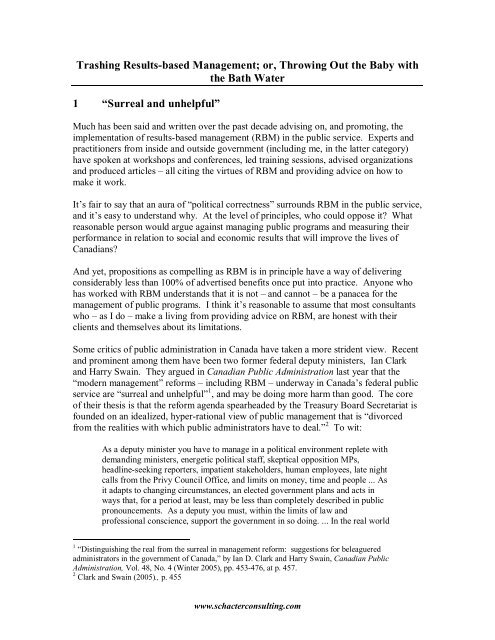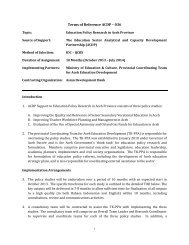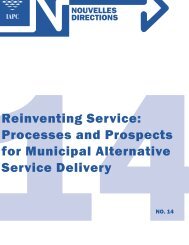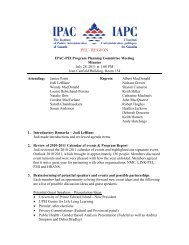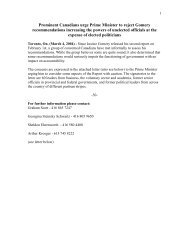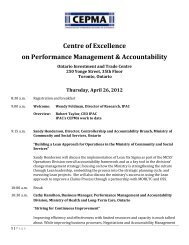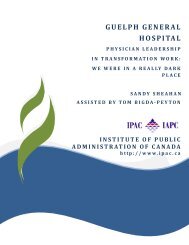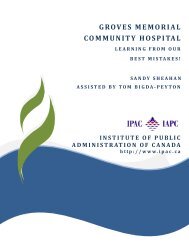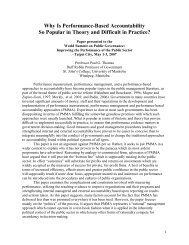In Defence of Results-Based Management by Mark Schacter
In Defence of Results-Based Management by Mark Schacter
In Defence of Results-Based Management by Mark Schacter
Create successful ePaper yourself
Turn your PDF publications into a flip-book with our unique Google optimized e-Paper software.
Trashing <strong>Results</strong>-based <strong>Management</strong>; or, Throwing Out the Ba<strong>by</strong> with<br />
the Bath Water<br />
1 “Surreal and unhelpful”<br />
Much has been said and written over the past decade advising on, and promoting, the<br />
implementation <strong>of</strong> results-based management (RBM) in the public service. Experts and<br />
practitioners from inside and outside government (including me, in the latter category)<br />
have spoken at workshops and conferences, led training sessions, advised organizations<br />
and produced articles – all citing the virtues <strong>of</strong> RBM and providing advice on how to<br />
make it work.<br />
It’s fair to say that an aura <strong>of</strong> “political correctness” surrounds RBM in the public service,<br />
and it’s easy to understand why. At the level <strong>of</strong> principles, who could oppose it? What<br />
reasonable person would argue against managing public programs and measuring their<br />
performance in relation to social and economic results that will improve the lives <strong>of</strong><br />
Canadians?<br />
And yet, propositions as compelling as RBM is in principle have a way <strong>of</strong> delivering<br />
considerably less than 100% <strong>of</strong> advertised benefits once put into practice. Anyone who<br />
has worked with RBM understands that it is not – and cannot – be a panacea for the<br />
management <strong>of</strong> public programs. I think it’s reasonable to assume that most consultants<br />
who – as I do – make a living from providing advice on RBM, are honest with their<br />
clients and themselves about its limitations.<br />
Some critics <strong>of</strong> public administration in Canada have taken a more strident view. Recent<br />
and prominent among them have been two former federal deputy ministers, Ian Clark<br />
and Harry Swain. They argued in Canadian Public Administration last year that the<br />
“modern management” reforms – including RBM – underway in Canada’s federal public<br />
service are “surreal and unhelpful” 1 , and may be doing more harm than good. The core<br />
<strong>of</strong> their thesis is that the reform agenda spearheaded <strong>by</strong> the Treasury Board Secretariat is<br />
founded on an idealized, hyper-rational view <strong>of</strong> public management that is “divorced<br />
from the realities with which public administrators have to deal.” 2 To wit:<br />
As a deputy minister you have to manage in a political environment replete with<br />
demanding ministers, energetic political staff, skeptical opposition MPs,<br />
headline-seeking reporters, impatient stakeholders, human employees, late night<br />
calls from the Privy Council Office, and limits on money, time and people ... As<br />
it adapts to changing circumstances, an elected government plans and acts in<br />
ways that, for a period at least, may be less than completely described in public<br />
pronouncements. As a deputy you must, within the limits <strong>of</strong> law and<br />
pr<strong>of</strong>essional conscience, support the government in so doing. ... <strong>In</strong> the real world<br />
1 “Distinguishing the real from the surreal in management reform: suggestions for beleaguered<br />
administrators in the government <strong>of</strong> Canada,” <strong>by</strong> Ian D. Clark and Harry Swain, Canadian Public<br />
Administration, Vol. 48, No. 4 (Winter 2005), pp. 453-476, at p. 457.<br />
2 Clark and Swain (2005)., p. 455<br />
www.schacterconsulting.com


